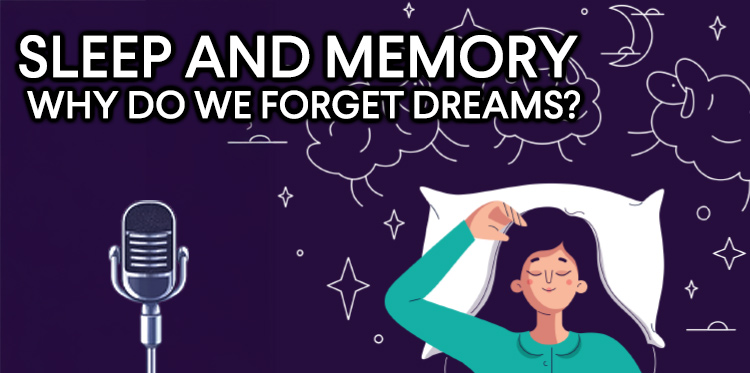Why Do We Forget Our Dreams?

The Science of Sleep and Memory
Have you ever woken up with a faint memory of a dream, only to have it slip away within minutes? It’s a common experience and one that leaves many of us wondering why we forget our dreams, and if there is a way to remember them?
Dreams are a fascinating part of our sleep cycle, yet most of them vanish as if they never happened. Research tells us that our brains are designed to forget dreams. This isn’t because our dreams are not important but because they don’t always serve a long-term purpose.
Why Do We Forget Our Dreams So Quickly?
One of the main reasons we forget dreams is because of how our brains process memory storage during sleep.
A study from the Lyon Neuroscience Research Centre found that people who wake up frequently during the night tend to remember more dreams, while deep sleepers often forget theirs entirely. This happens because the hippocampus, the part of the brain responsible for memory, isn’t fully engaged during REM sleep - the stage where most dreams occur.
Instead of storing dream experiences like the memories we have when we are awake, the brain treats dreams as temporary, unimportant data. This means that unless we wake up at the right moment, or take immediate deliberate action to recall our dreams, they disappear quickly.
What Part of the Brain Controls Dream Memory?
Several brain regions play a role in dreaming and dream recall:
Hippocampus: This is the brain's memory storage centre but, during sleep, it doesn't function as efficiently, making it harder to retain dream memories.
Prefrontal Cortex: This part of the brain controls logic and decision-making, but it is mostly inactive during REM (Rapid Eye Movement) Sleep. That's why dreams can sometimes feel illogical or surreal - our brain isn't applying rational thought to them.
Amygdala: This area in our brain processes emotions and is highly active during REM sleep. This is why dreams can often feel intense or emotionally charged.
A 2011 study in Neuron also found that brain waves in deep sleep suppress memory formation. This suggests that forgetting dreams isn’t a flaw but is something our brains actively do to prevent unnecessary information overload.
Can You Train Yourself to Remember Dreams?
If you want to boost your ability to remember your dreams, here are four effective techniques:
1️. Keep a Dream Journal: One of the best ways to remember dreams is to write them down as soon as you wake up. Even if you only remember a fragment of your dream, jot it down. Over time, this practice strengthens the neural connections involved in memory storage, making it easier to recall dreams in the future.
2️. Set an Intention Before Sleep: Before going to bed, say to yourself: "Tonight, I will remember my dreams”. This simple mental cue increases dream awareness, making it more likely that you’ll wake up with a clearer memory of your dreams.
3️. Avoid Abrupt Wakeups: If you wake up suddenly to a loud alarm, your brain shifts from sleep to wakefulness too quickly, making dream memories fade instantly. Try using a gentler alarm or waking up naturally to give yourself a better chance of recalling your dreams.
4️. Improve Your Sleep Environment: Uninterrupted, quality sleep is key to better dream recall. If you sleep well, your brain functions optimally meaning it’s more likely to store and retrieve memories, including dreams. Try switching to a temperature regulating, natural duvet - such as a wool duvet that will work with your core body temperature to help keep it balanced whilst you sleep. This will help to lessen the chances of interrupted sleep because you are feeling too hot or too cold.
Frequently Asked Questions About Dreams and Memory
Why do some people remember dreams better than others?
People who wake up frequently during the night tend to recall shorter, sometimes disjointed, dreams because they spend more time in lighter sleep stages, where these types of dream memories are easier to access. Those who sleep deeply may not wake up during REM sleep, making it harder to retain dreams. Certain personality traits, such as higher creativity and emotional sensitivity, are also linked to better dream recall.
Does stress affect dream memory?
Stress can increase the frequency of vivid dreams or nightmares, but it can also make them harder to recall. High cortisol levels (the stress hormone) disrupt memory processing, making it difficult to retain dream details after waking. If you’re experiencing stress-related sleep disturbances, then it is probably time to evaluate your pre-bedtime activities and your sleep environment, such as reducing screen time before bed and opting for natural bedding.
How can changing my bedding help me remember more dreams?
A comfortable, uninterrupted sleep improves overall brain function, including memory retention. Natural materials such as wool help regulate body temperature and wick away moisture, preventing overheating or night sweats, which can wake you up too frequently and disrupt your sleep cycle. At Devon Duvets, we handcraft our duvets using 100% traceable British wool, free from synthetic chemicals, thereby ensuring a pure, natural sleep experience that supports both body and mind.
Final Thoughts: Can You Unlock Your Dreams?
Dreams are like fleeting whispers from our subconscious - gone too soon unless we train ourselves to remember them. Tonight, why not try setting an intention to recall your dreams? Keep a notebook by your bed and write down whatever you remember. You may be surprised at what your mind reveals!
Visit our website and explore our award-wining soft bedding. Each duvet, topper and pillow are individually handcrafted for you by our experienced seamstresses in our workshops on the edge of Dartmoor and have been designed to help you to achieve a more restful night’s sleep. At Devon Duvets we believe that when you sleep well, you dream well - and when you dream well, anything is possible.


